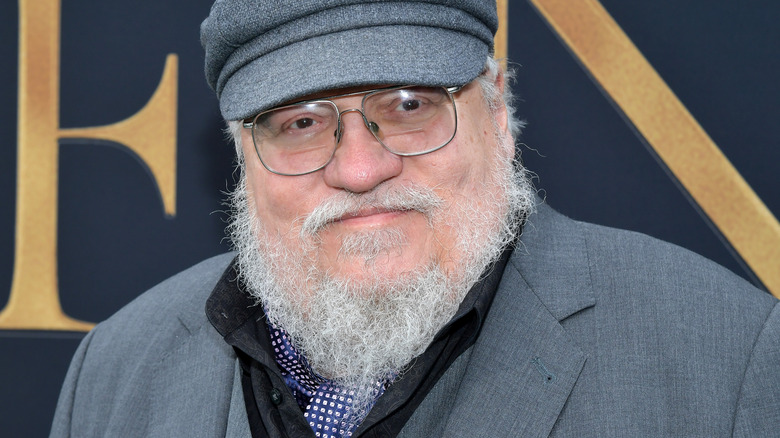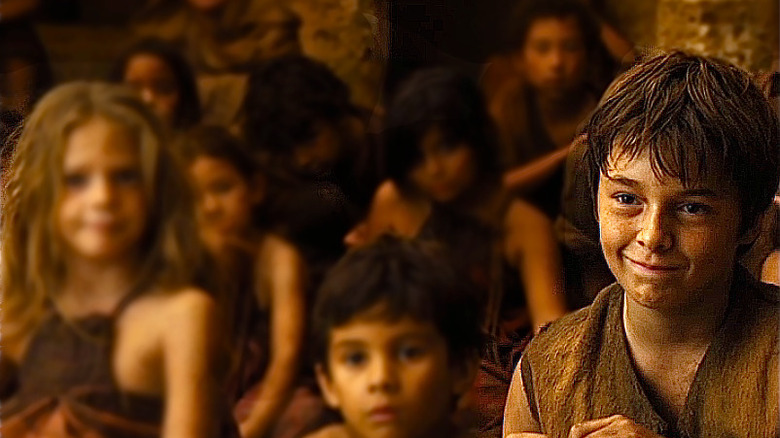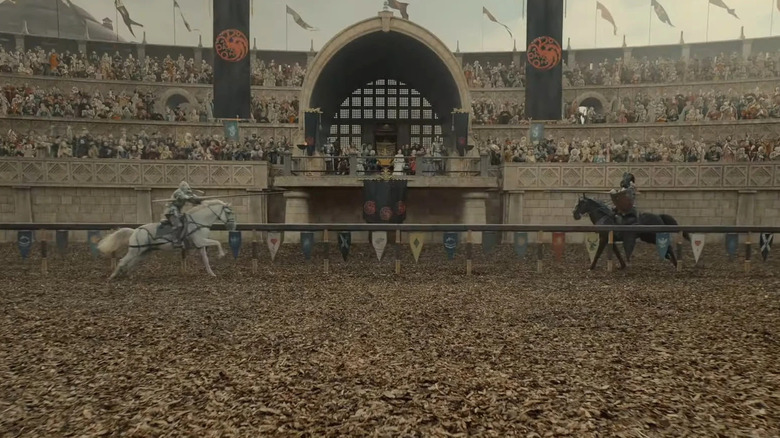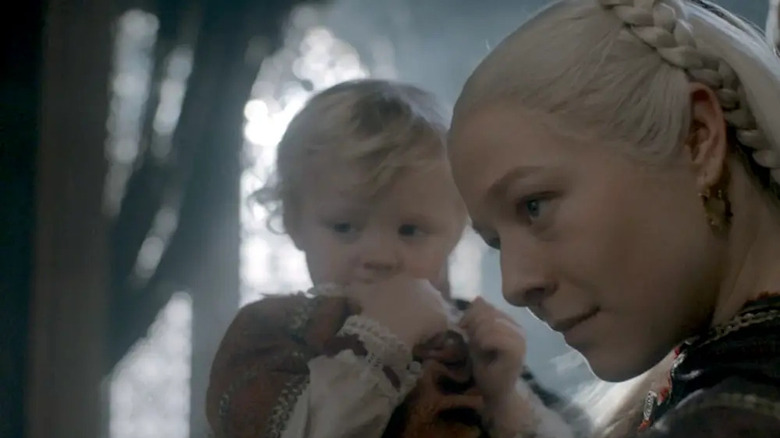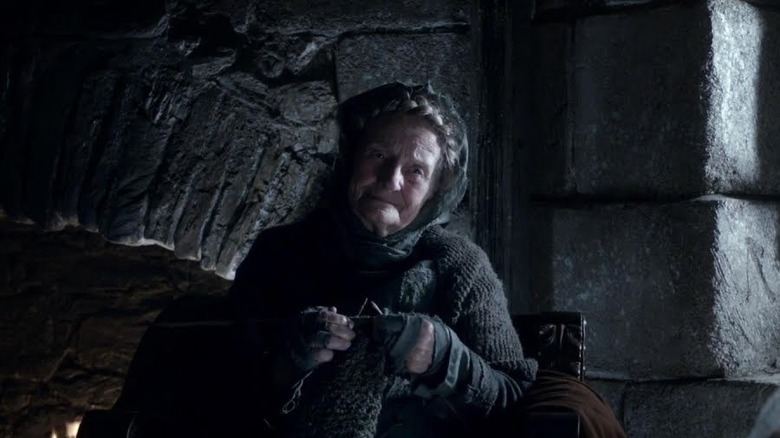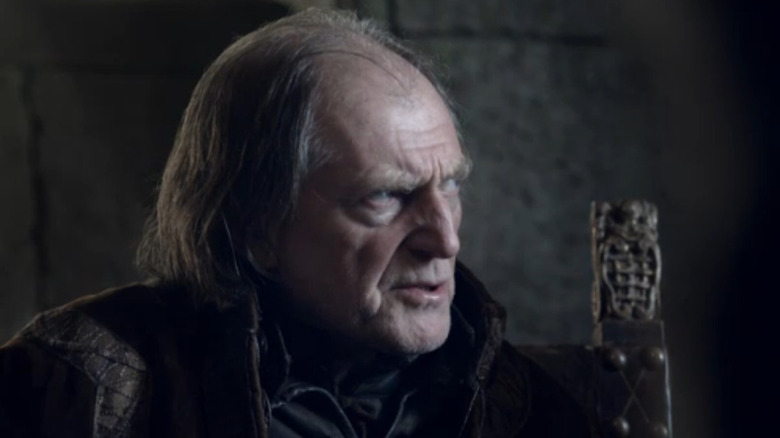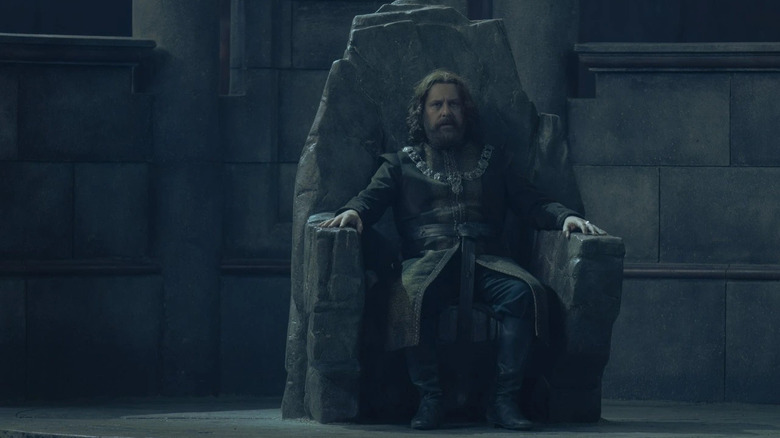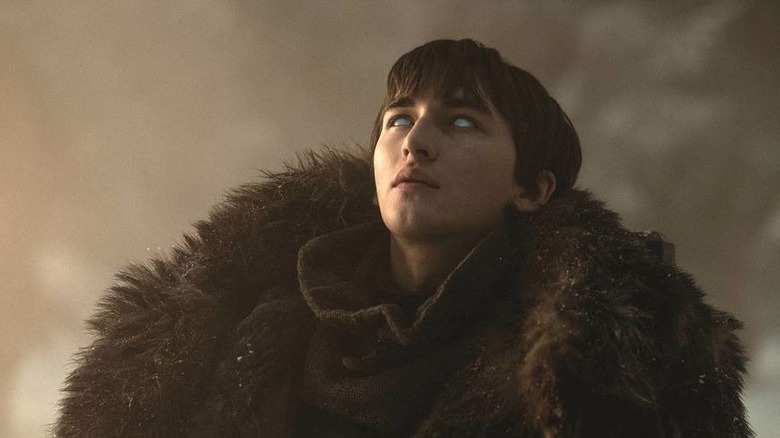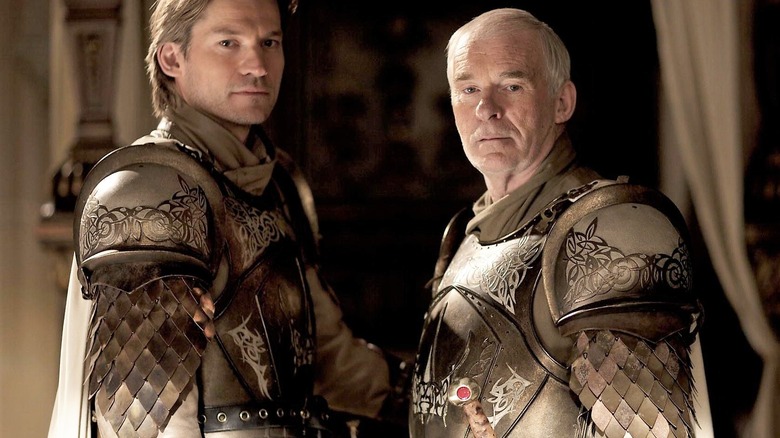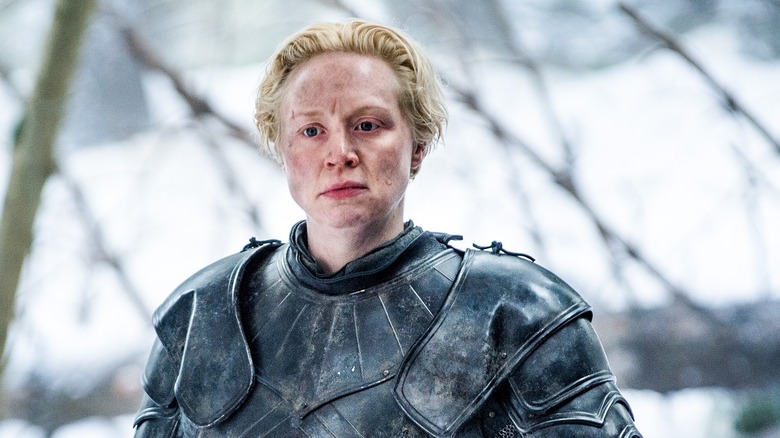Ser Duncan The Tall Facts Only Game Of Thrones Fans Know About Dunk & Egg's Knight
Now that HBO has officially given the thumbs up to "A Knight of the Seven Kingdoms: The Hedge Knight" by way of its rebranded streaming service Max, "Game of Thrones" viewers are about to meet one of Westeros' biggest and best characters. The planned series will dramatize what are commonly called the "Tales of Dunk and Egg." Based on the announced title, we can assume that the first season will cover the first of the three novellas that make up "A Knight of the Seven Kingdoms," which is called "The Hedge Knight." If this latest spin-off's a hit, we'll likely get two more seasons based on the second and third installments, "The Sworn Sword" and "The Mystery Knight." All three titles refer to the same man, who will be the protagonist of the show.
Intimate and lighthearted by Westeros standards, "Dunk and Egg" stories are among the source material that enthusiastic readers of George R. R. Martin's writing were most eager to see brought to screen. In part, that's because Ser Duncan the Tall, or Dunk, is such a likable character. He's been referenced on "Game of Thrones" before, but Max's "A Knight of the Seven Kingdoms: The Hedge Knight" will give both book readers who already love him and show watchers who are sure to do the same soon enough a chance to spend ample time in his company. If you're just learning about Dunk or only remember his name from the songs, this is everything you need to know about the titular hedge knight.
He hails from the humblest of beginnings
"Game of Thrones" and "House of the Dragon" have introduced us to many a character who had a rough start in life. Think Gendry or Aegon II's illegitimate children. Dunk, too, was orphaned at birth. Throughout the three novellas, we get clues as to his parentage or at least the circumstances of his abandonment, but the eventual knight isn't even sure about his own name and age. He assumes that he's a bastard or that his father was a criminal bound for the Wall. Dunk spends his early childhood on the streets of Flea Bottom, where he and his fellow wayward toddlers would survive by selling scraps of unidentified meat to be cooked in bowls of brown. As an adult, he would admit to having been wild and unscrupulous in his youth; he considered him and his friends to have been "little monsters" and thought himself the worst of the bunch.
When he was about 5 or 6 years of age (though some accounts suggest he may have been even younger), he was given an opportunity that changed his life in ways he couldn't have imagined. A hedge knight traveling through King's Landing was in need of a new squire and found one chasing a pig through an alley. Ser Arlan of Pennytree took Dunk under his wing. For roughly 10 years, Dunk faithfully served Ser Arlan, who taught him what it meant to be a knight. He appreciated the man's kindness and credited him for making him the person he became, though asides reveal that Ser Arlan slapped or beat him on occasion.
He came by his name (but maybe not his title) honestly
When Ser Arlan dies of old age and exposure to inclement weather en route to a tourney in Ashford, Dunk is left to bury the body and decide what to do next. He takes ownership of Ser Arlan's armor, horses, and equipment, and travels to Ashford alone, intent on entering the contest. This is easier said than done. As he's not Arlan's son, he can't use his sigil. And to enter the tournament, he has to provide a name. The one he provides is Ser Duncan the Tall. Dunk reasons that he can't say he's from Pennytree because he's never been there, and he can't call himself Ser Duncan of Flea Bottom. The most noteworthy thing about him is his height. One passage claims Dunk is closer to 7 feet than 6, and another puts him at 6 feet 11 inches. He's a large man, but only 16 or 17 during the events of "The Hedge Knight," and Martin implies that, at this age, he has not yet filled out his frame.
Whether or not he's actually a knight is another matter. Dunk puts forth that Ser Arlan bestowed the honor upon him before his passing (as he would've had the power to do), but since there were no witnesses present and owing to his lower-class appearance, his claim is met with suspicion. There is no scene in which Ser Arlan knights Dunk in the books, and it's heavily implied Dunk made it up so that he could ascend to knighthood. Luckily, Prince Baelor Targaryen fondly remembers Dunk's late patron and accepts Ser Duncan the Tall's story as the truth.
He unintentionally acquired a very important squire
"A Knight of the Seven Kingdoms: The Hedge Knight" will be yet another entry into what's fast becoming TV's most popular subgenre — the lone wolf and cub narrative. That's because, only a few pages into the text that inspired the show, Dunk makes the acquaintance of Egg — a peculiar and special young boy who will become his traveling companion. He first comes upon Egg when he's bathing in a stream, which allows Dunk to see that the kid is short, scrawny, and bald though he's only about 9 years old. Egg appears to be working as a stable boy but desperately wants to be Dunk's squire. The self-made knight refuses at first but relents when Egg tells him that the innkeepers aren't his parents; he's an orphan.
Egg's plight tugs at Dunk's heartstrings. Having been orphaned himself and having been given a way out of that miserable life, he somewhat begrudgingly extends the same generosity to the boy. The strange, hairless child is unusually insightful and quick witted, and it isn't long before Dunk figures out why. While the nickname fits with his smooth dome of a head, it's also the first syllable of Aegon. At a crucial moment that saves his supposed master from punishment and perhaps death, Egg reveals himself to be a Targaryen prince. Events — both fortuitous and tragic — unfold shortly thereafter, but the result is that Egg is given permission to stay on as Ser Duncan's squire, and to tour Westeros in his service in order to learn true honor, so long as he continues to use his alias to avoid scandal or risk.
He was something of a ladies' man
Knights are frequently associated with chivalry — a code of behavior that prizes bravery, honor, justice, and selflessness. In the modern parlance, the term gets attached to practices like holding doors open or paying for dinner, but technically, chivalric love is about righteousness and politeness more than passion.
Ser Duncan demonstrates his chivalric tendencies consistently throughout the Dunk and Egg stories, but he's also a romantic who can't help but pursue women. When he needs to commission a new sigil for his shield, he turns to the possible love of his life (though they never so much as touch), Tanselle. This Dornish puppeteer wound up with a similar nickname — Tanselle Too Tall — thanks to her unusual height for a female. She paints his personal coat of arms — a shooting star over an elm tree at sunset — and he intervenes when she's being brutally attacked by a sadistic Targaryen prince. Dunk takes Egg to Dorne, hoping to reconnect with Tanselle.
The hedge knight also wades into some relationship drama while in the service of Ser Eustace Osgrey. He develops feelings for Osgrey's foe, the widowed Lady Rohanne. Despite their differences in allegiance and status, those feelings are mutual, but things still end unhappily for the pair. Because Martin has said that Dunk did sire at least one child, we know he had other lovers. One popular theory holds that Old Nan, who gleefully recounts tales of Ser Duncan to Bran, was among them. This is seemingly supported by the fact that Bran experiences a vision of young Nan kissing a knight fitting Dunk's description.
He got caught up in the Blackfyre Rebellions more than once
The Blackfyre Rebellions take up a chunk of the timeline in between the events of "House of the Dragon" and "Game of Thrones." They're too complex, with too many characters, locations, and dates to be easily explained in a paragraph, but here's the short version: The family of a legitimized Targaryen bastard repeatedly attempts to win back the Iron Throne five times over a period of about 65 years. Some of these uprisings pose a more serious threat to ruling Targaryens than others. The First Blackfyre Rebellion has just ended when Ser Arlan brings Dunk on as his squire.
Dunk and Egg consider abandoning their post with Ser Eustace Osgrey when they discover he was loyal to the Blackfyres. Dunk is obviously loyal to the Targaryens, due in part to his close connection with Prince Aegon, who's in line to succeed the throne. He somewhat inadvertently thwarts the Second Blackfyre Rebellion before it even begins when he and Egg enter a wedding tournament at Whitewalls (attended by "Thrones" villain Walder Frey), where a dragon egg is advertised as the prize for the winner. Prince Aegon goes missing, as does the egg, and in trying to find both, Dunk deduces that a mysterious figure known as John the Fiddler is actually Daemon II Blackfyre. The tourney had been a ruse to gather those sympathetic to the Blackfyre line's claim in one place and to allow Daemon (for whom it was rigged) to win. As a member of the Kingsguard, Dunk put an end to the Fourth Blackfyre Rebellion as well when he slaughtered the next challenger to the Throne, Daemon III.
Though he was a commoner, he crossed paths with many noble families
"A Knight of the Seven Kingdoms" will be populated by almost entirely new characters, but most viewers will probably recognize a great many of their last names and family crests. Depending on how closely the series follows the text, we could be visiting some familiar locations. Just in the first volume of the collected "Tales of Dunk and Egg," the hedge knight interacts with Baratheons, Beesburys, and Fossoways, not to mention the majority of the royal family of Targaryens. When Dunk is forced to compete in what's known as a trial of seven (the accused and the accuser each select six other knights to fight along with them), he must hastily assemble a team of allies. Men from Westeros' noble families step up to join both sides.
In parts two and three, we get mentions of the Starks, the Greyjoys, the Lannisters, the Freys, and myriad other lesser known but established houses. If the series continues beyond Season 1, we'll also likely get to see younger versions of "Game of Thrones" characters whose life spans overlap with those of Ser Duncan and Aegon V Targaryen. In addition to Walder Frey, these include Ser Barristan Selmy, whom he faces in a tourney, and Maester Aemon Targaryen, whom he accompanies to his post on the wall. One meaningful difference between the Dunk's story is that it will mark the first time audiences experience the world of "Game of Thrones" primarily from the point of view of a commoner.
He was destined for greatness
One of the most relatable things about Dunk is that he doesn't think of himself as great, as so many "Thrones" personalities do. Because of his humble origins and his wishy-washy claim to knighthood, he experiences something akin to imposter syndrome and undervalues his own abilities and intelligence. Sure, he wasn't formally educated, and he doesn't have Tyrion's way with words, but Dunk isn't nearly the lunkhead he fears he is. In fact, his personal journey through Westeros' high and low society as well as fate itself may have conspired to create the right man for the right moment.
Dunk isn't necessarily the best at any given skill. Martin writes that he's good with a sword and even better with an ax or mace. However, one of his major advantages in a fight and in life is that he can pull from what he learned on the streets of Flea Bottom, what he learned from Ser Arlan, and what he's learned from Egg in any situation. This means he can wrestle, plot, or charm his way out of a pickle, depending on what the day calls for. More to the point, multiple characters throughout "A Knight of the Seven Kingdoms" and Martin's other volumes have prophetic dreams about Ser Duncan, including Daeron the Drunken, Daemon II Blackfyre, and, as previously mentioned, Bran Stark. The "A Song of Ice and Fire" books and the "Game of Thrones" shows often debate within themselves whether dreams can be trusted to foretell one's destiny, but in the case of Ser Duncan the Tall, they seem to have been reliable.
He became legendary shortly after his death
By the time Ned Stark is summoned to King's Landing to serve as Hand of the King to Robert Baratheon, Ser Duncan the Tall is already dead. But in only 40 years, his unlikely life story and his rise to one of the highest positions in the Seven Kingdoms — that of Lord Commander of King Aegon V's Kingsguard — has already become legendary. In the books that comprise the as-of-yet-unfinished "A Song of Ice and Fire" and in the HBO series, Ser Duncan has many admirers. Among them is Ser Jaime Lannister, who gives him a shout out when he considers the great men who came before him. Later, when Joffrey is surprised that there are four whole pages devoted to Ser Duncan in The Book of Brothers (a historical account of every knight who's ever served in the Kingsguard), which is unusual, Jaime confirms that he was indeed quite a man deserving of the attention.
Dunk fulfilled his knightly responsibilities to the very end. Aegon V named one of his sons after him, and when that Duncan chose to marry a commoner, it was his namesake who defeated the scorned would-be father-in-law — his one-time ally, Lyonel Barathan — to quell another potential uprising. Ser Duncan died along with his king in the infamous Tragedy at Summerhall, which is one of the pivotal events in Martin's entire body of work. It's possible that the final season of "A Knight of the Seven Kingdoms" could dramatize this key moment in "Thrones" history. If we do get a live-action Tragedy at Summerhall, legends suggest that Ser Duncan spends his final moments saving as many people as he can.
His descendant is a fan-favorite character
Though the "Tales of Dunk and Egg" tie into existing "Game of Thrones" lore at nearly every turn, there's one particular tie-in — teased by George R. R. Martin himself — that fans are most excited to see unfold on screen. Martin has more or less confirmed that Ser Duncan the Tall is the ancestor of Brienne of Tarth. This isn't altogether surprising, since Brienne towers above all the women and nearly all the men with whom she comes into contact. But the author, who will co-produce and co-write "A Knight of the Seven Kingdoms: The Hedge Knight," hasn't filled in any of the juicy details as to how Duncan begets Brienne. He's only hinted that the truth will come out at some point in his epic masterwork's future.
Fans suspected as much before Martin went on the record about Dunk and Brienne's connection. Besides their height and prowess in tourneys and battle, Brienne's family happens to have possession of Dunk's shield ... the one bearing the elm tree and the shooting star that Tanselle designed almost a century earlier. There are, of course, other ways that the Tarths could've inherited the shield. It could've been won or purchased. But since Brienne's family lineage is murky compared to some of Westeros' other noble families (her mother and brothers are dead; her grandparents aren't named), some readers have theorized that Ser Duncan may have fathered a child while in the Kingsguard, and the pregnant woman may have been hastily married off to an older lord to cover up the indiscretion. Only time — and future "Game of Thrones" content — will tell.
